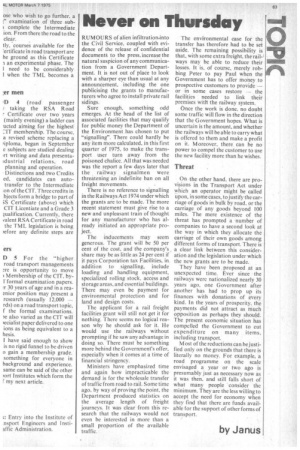Never on Thursday
Page 85

If you've noticed an error in this article please click here to report it so we can fix it.
RUMOURS of alien infiltration.into the Civil Service, coupled with evidence of the release of confidential documents to the press, increase the natural suspicion of any communication from a Government Department. It is not out of place to look with a sharper eye than usual at any announcement, including the one publicising the grants to manufacturers who agree to install private rail sidings.
Sure enough, something odd emerges. At the head of the list of associated facilities that may qualify for public money the Department of the Environment has chosen to put "signalling". There could hardly be any item more calculated, in this first quarter of 1975, to make the transport user turn away from the poisoned chalice. All that was needed was the report a few days later that the railway signalmen were threatening an indefinite ban on all freight movements.
There is no reference to signalling in the Railways Act 1974 under which the grants are to be made. The more recent statement must give rise to a new and unpleasant train of thought. for any manufacturer who has already initiated an appropriate project.
The inducements may seem generous. The grant will be 50 per cent of the cost, and the company's, share may be as little as 24 per cent if it pays Corporation tax Facilities, in addition to signalling, include loading and handling equipment, specialized rolling stock, access and storage areas, and essential buildings. There may even be payment for environmental protection and for land and design costs.
The applicant for a rail freight facilities grant will still not get it for nothing. There seems no logical reason why he should ask for it. He would use the railways without prompting if he saw any advantage in doing so. There must be something more behind the Government's offer, especially when it comes at a time of financial stringency.
Ministers have emphasized time and again how impracticable the demand is for the wholesale transfer of traffic from road to rail. Some time ago. by way of proving the point, the Department produced statistics on the average length of freight journeys. It was clear from this research that the railways would not even be interested in more than a small proportion of the available traffic. The environmental case for the transfer has therefore had to be set aside. The remaining possibility is that, with some extra freight, the rail-1 ways may be able to reduce their losses. It is, of course, merely robbing Peter to pay Paul when the Government has to offer money to prospective customers to provide — or in some cases restore — the facilities needed to link their premises with the railway system.
Once the work is done, no doubt some traffic will flow in the direction that the Government hopes. What is uncertain is the amount, and whether the railways will be able to carry what is offered to them and make a profit on it. Moreover, there can be no power to 'compel the customer to use the new facility more than he wishes.
Threat
On -the other hand, there are provisions in the Transport Act under which an operator might be called upon, in some cases, to justify the carriage of goods in bulk by road, or the carriage of any goods beyond 100 miles. The mere existence of the threat has prompted a number of companies to have a second look at the way in which they allocate the carriage of their own goods among different forms of transport. There is a clear link between this consideration and the legislation under which the new grants are to be made.
They have been proposed at an unexpected time. Ever since the railways were nationalized nearly 30 years ago, one Government after another has had to prop up its finances with donations of every kind. In the years of prosperity, the payments did not attract as much opposition as perhaps they should. The present economic situation has compelled the Government to cut expenditure on many items, including transport.
Most of the reductions can be justified only on the grounds that there is literally no money. For example, a road programme on the scale envisaged a year or two ago is presumably just as necessary now as it was then, and still falls short of what many people consider the minimum. They are the less willing to accept the need for economy when they find that there are funds available for the support of other forms of transport.
by Janus












































































































































































